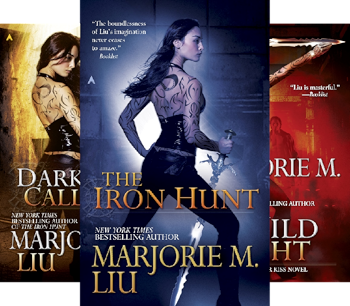
 The Iron Hunt by Marjorie M. Liu
The Iron Hunt by Marjorie M. Liu
“When I was eight, my mother lost me to zombies in a one-card draw.”
That’s the first sentence of Marjorie M. Liu’s The Iron Hunt, and it’s just about perfect as opening lines go. It’s the primary reason I bought the book. Not only does it draw the reader in, eager to find out how and why this happened, but I’m also pretty darn sure it’s an Angela Carter reference. I love Angela Carter.
It would be misleading to suggest, though, that Marjorie M. Liu sounds like Angela Carter throughout The Iron Hunt. Liu has a different style, one all her own. I loved it. Liu’s style is unusual and won’t be to everyone’s taste. However, I found it visceral and poetic at the same time, and especially good when describing violence and magical visions. A couple of examples:
I tried to hold her to me, but she slipped away, and zombies took her place. So many. Shoulders broad as mountains. Packed tight. Breath hot. Stinking with sweat and winter wool. I could not see faces for shadows, but the zombie in the suit leaned close. Crooked his finger like a hook.
Waking dreams. Walking dreams. Swift dreams, black and white like old scratchy movies tinted and blurred with age. I dreamed in sparks and moments, and saw women in moonlight, pale as snow, hair as black as a raven’s wing — steel in their hands, always, sword bound, hair bound, in sunlight, tattoo bound — and I flew with them, I ran, and their bodies merged into one, a woman large as thunder, with eyes like the starry night, and wolves at her back.
 Another aspect of The Iron Hunt that worked well for me was the mythos. Liu blends the myths of many cultures into her story, mixing Sumerian, Asian, Celtic, and Greek in a way that never feels forced or awkward; instead it gives the reader the sense that all of these cosmologies are valuable but incomplete shards of one vast long-forgotten whole.
Another aspect of The Iron Hunt that worked well for me was the mythos. Liu blends the myths of many cultures into her story, mixing Sumerian, Asian, Celtic, and Greek in a way that never feels forced or awkward; instead it gives the reader the sense that all of these cosmologies are valuable but incomplete shards of one vast long-forgotten whole.
Liu’s Seattle is painted in — I’d say vivid color, but this is Seattle, so it might be more accurate to say rainy grays. There is a real sense of place in The Iron Hunt.
A small gripe, and this may be a case where the cover-blurb writer sold the novel writer short: there isn’t really a romantic subplot.
The blurb gives the impression that this is a major focus of the story when, in fact, the heroine and the love interest are already involved and their relationship is written more as background than as plot. I gather that this romantic subplot was actually resolved in a previous short story by Liu. It’s not so much that the novel needs a major romantic plot; it’s just that it was weird to find the plot quite different from the blurb. The real plot has more to do with Maxine’s discovery of new and frightening powers and her growing awareness of her mother and grandmother’s history.
I highly recommend The Iron Hunt to anyone who likes urban fantasy, tough female characters, and unique prose. I will definitely be looking up more of Liu’s work while I await the sequel to The Iron Hunt.



It would give me very great pleasure to personally destroy every single copy of those first two J. J. Abrams…
Agree! And a perfect ending, too.
I may be embarrassing myself by repeating something I already posted here, but Thomas Pynchon has a new novel scheduled…
[…] Tales (Fantasy Literature): John Martin Leahy was born in Washington State in 1886 and, during his five-year career as…
so you're saying I should read it? :)